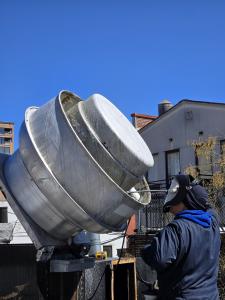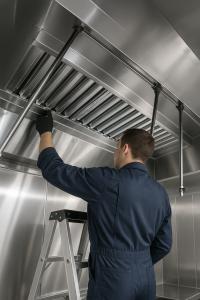How grease buildup and overlooked fire safety practices are threatening restaurants from Miami to Delray Beach.
MIAMI, FL, UNITED STATES, May 9, 2025 /EINPresswire.com/ -- Lunchtime patrons at a popular Delray Beach bistro got a fiery surprise last summer. A small flare-up in the kitchen of Lemongrass Asian Bistro on Atlantic Avenue suddenly raged out of control, sending flames racing into the exhaust hood. Four people were taken to the hospital after firefighters rushed in to battle a kitchen grease fire that had spiraled beyond the stovetop. Just a few months later, plumes of black smoke billowed across Miami’s Brickell skyline when an upscale downtown restaurant’s vent caught fire. City of Miami Fire Rescue crews contained the blaze at Zuma, a high-end spot in the EPIC Hotel, but not before a fire inside the vent of a kitchen hood sent heavy smoke pouring out of the building. These incidents underscore a dangerous truth: many South Florida restaurants are gambling with kitchen fire safety by neglecting a dirty little secret above their stoves. South Florida’s vibrant dining scene – from the Cuban cafés of Calle Ocho to the trendy eateries of South Beach – has no shortage of heat in the kitchen. But behind the sizzle and spice, there’s an overlooked task that can make the difference between a normal day’s service and a three-alarm disaster: commercial hood cleaning. “You wouldn’t believe how many restaurants down here think a quick wipe on the hood is enough,” says Jacob Chechkov, CEO of Done Right Hood & Fire Safety, shaking his head. Chechkov, a New Yorker by way of Brooklyn now protecting restaurants in Miami, speaks in a frank, no-nonsense tone. “Look, I tell them the hard truth: grease fire hazards don’t care how good your ceviche or ropa vieja is,” he says. “If you don’t clean that hood, you’re basically hanging a ticking time bomb over your grill.” Chechkov’s company specializes in scrubbing out the grease that accumulates in restaurant exhaust systems, and he’s seen firsthand what happens when owners cut corners. Regular commercial hood cleaning is more than a chore – it’s a critical part of kitchen fire safety. In every busy kitchen, as chefs sauté and fry, tiny droplets of oil and food particles get drawn up into the exhaust hood. The hood’s grease filters catch some, but over time a stubborn film builds up on the duct walls and fan blades. Left untouched, that film turns into fuel. “It’s basically kindling lining your ventilation,” Chechkov warns. “One spark and foom! – it’ll run through the exhaust ducts like it’s chasing an express train.” In fact, according to a National Fire Protection Association study, nearly 8,000 eating and drinking establishment fires occur annually in the U.S., causing around $246 million in property damage. In about one out of every five of those fires, “failure to clean” grease buildup was a key contributing factor. That means thousands of blazes might have been prevented by something as simple as regular hood cleaning.A hood cleaning specialist power-washes grease from a restaurant’s exhaust canopy. Removing the greasy residue that builds up in ducts is crucial to preventing flash fires. Florida’s fire officials know this danger all too well. The Florida Fire Prevention Code (based on NFPA standards) requires commercial kitchens to keep exhaust systems clean and fire-ready. In Miami, fire inspectors expect high-volume restaurants to get a professional hood cleaning roughly every three months and to keep proof on site. Yet some establishments still roll the dice, delaying this “back-of-house” task to avoid interrupting business. “We get it, nobody wants to shut down their restaurant for a night to clean the exhaust hood,” says Tony Diaz, a veteran hood technician with Done Right Hood Cleaning. Originally from Queens, Diaz has a blunt style that often wakes up complacent managers. “But hey, you either pay for a hood and duct cleaning or pay for an unscheduled rebuilding of your kitchen after a fire – your call,” he says with a wry laugh. Diaz recalls opening up commercial exhaust systems in South Florida restaurants to find inches of greasy gunk. “I’ve seen ducts so thick with grease you could scrape it out with a razor sharp putty knife. That stuff lights up like a Christmas tree if you give it a chance,” he adds. The threat isn’t just to a single restaurant. Grease fires can spread with frightening speed once they extend into the exhaust ductwork. Unlike other parts of a building, kitchen exhaust ducts are designed without fire dampers (grease could disable those), so a flame that gets in can travel unabated. Firefighters often describe it like a chimney effect – flames and smoke whoosh through the vent system, sometimes erupting on the roof or in distant corners of the building. “We’ve seen a spark start on a grill and end up igniting a blaze in an attic space 30 feet away,” Chechkov notes. In one dramatic case, a blaze at a Florida seafood restaurant leapt from a fryer into long-neglected ductwork. The restaurant’s built-in fire suppression system should have doused the flames, but it never even activated – its sensors were coated in grease and grime, essentially blind to the fire.
With no automatic fire suppression system and the manual pull station blocked by clutter, the flames raged until they reached the roof. By the time firefighters arrived, the fire had spread through the hood and even compromised the building’s structure. “That place was a total loss for one reason: they tried to save a few bucks by skipping maintenance,” Chechkov says. “They thought, ‘Ah, it won’t happen to me.’ Well, it did happen, and it wiped them out.” It’s not an isolated scenario. Fire investigators in Florida and around the country have repeatedly traced devastating restaurant fires back to grease-choked hoods or bungled safety upkeep. A grease fire hazard can lurk for months unnoticed, until the day a little flame finds it and goes looking for trouble. Even top-tier eateries aren’t immune – the smoky scene at Miami’s Zuma this past December is proof that any kitchen can face danger if conditions align. Fortunately, that fire was contained before tragedy struck. But others haven’t been as lucky. Just up the coast in Delray Beach, the blaze at Lemongrass Bistro sent three employees and a customer to the emergency room and shut down a busy downtown street in broad daylight. Officials cited it as a wake-up call about kitchen fire safety. And it’s a call experts hope more South Florida restaurateurs will heed.
The solutions are no mystery – they’re just often overlooked in the hustle of running a restaurant. Fire suppression systems (the hood-mounted sprinklers filled with special chemicals) must be inspected and serviced every six months in Florida to comply with code. Hood cleaning needs to happen on a routine schedule, with licensed and certified professionals scraping away every last bit of grease. Many restaurants are diligent about these tasks, scheduling overnight cleanings and keeping logbooks of service. But some, especially smaller or newer establishments, fall behind. Chechkov says education is key. “A lot of folks opening a café or food truck here didn’t even realize how often they’re supposed to clean the system. They’re busy worrying about food costs and payroll. Next thing you know, two years have gone by without a deep clean of the ducts and exhaust hoods” he explains. Fire Marshals in Miami-Dade and Broward have been stepping up surprise inspections, citations and handing out violations for grease-laden hoods or unserviced extinguishing systems which are on the rise, insiders say. For restaurant owners and managers, the message is clear: don’t ignore the hood. That metal canopy above the grill might not be as showy as the dining room décor, but it can make or break your business in one flash of flame. “Every chef in South Florida knows to watch the heat on the stove,” Diaz points out. “We’re just saying, watch the heat above the stove, too. That’s where yesterday’s mojo pork drippings are hiding – and they’re pretty flammable.” The cost of regular commercial hood cleaning and suppression maintenance is tiny compared to the cost of a shut-down (or worse, a life-threatening blaze). And beyond the immediate fire risk, a greasy hood also means inefficient ventilation, nasty odors, and even health code violations if inspectors find dripping grease. In other words, there’s no upside to skipping this chore. Chechkov puts it in perspective with a dose of New York bluntness and a South Florida twist. “Down here we get hurricanes, right? We board up windows, buy insurance, the whole nine yards,” he says. “Preparing for a kitchen fire is the same idea. Cleaning your hood and checking your fire suppression – that’s like putting up your storm shutters. You hope you never need ’em, but you’d better have ’em.” He pauses, then chuckles, “Trust me, I’ve been in this game a long time. Whether it’s Miami or Manhattan, grease is grease. If you don’t deal with it, it’ll deal with you.”
Jacob Chechkov
Done Right Hood & Fire Safety
email us here
Visit us on social media:
LinkedIn
Instagram
Facebook
YouTube
Legal Disclaimer:
EIN Presswire provides this news content "as is" without warranty of any kind. We do not accept any responsibility or liability for the accuracy, content, images, videos, licenses, completeness, legality, or reliability of the information contained in this article. If you have any complaints or copyright issues related to this article, kindly contact the author above.



